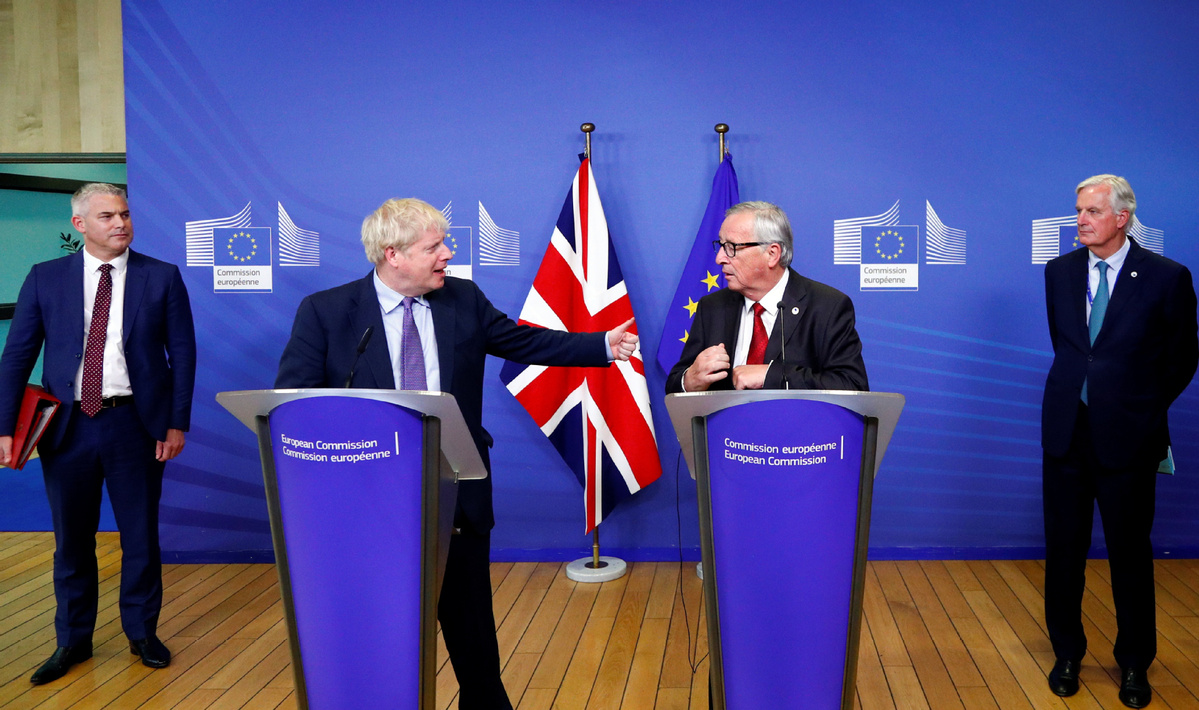EU, Britain reach new Brexit deal but uncertainties still remain
Xinhua | Updated: 2019-10-18 09:54

BRUSSELS - After rounds of day and night negotiation, leaders of the European Union (EU) and Britain declared Thursday that they have reached a new Brexit deal.
Despite cautious optimism over the new deal among EU members, fears of its failure in British parliament prevail in the air at the other side of the English Channel.
"Where there is a will, there is a #deal we have one! It's a fair and balanced agreement for the EU and the UK and it is a testament to our commitment to find solutions," said Jean-Claude Juncker, president of the European Commission, on his twitter account.
"We now have a newly agreed Protocol that protects peace and stability on the island of Ireland and fully protects our Single Market. I hope that we can now bring this over the line and provide the certainty our citizens and businesses so deserve," he noted in a press release published by the Commission.
Michel Barnier, the European Commission's chief negotiator, hailed the deal as "all-win".
"We had difficult discussions over the past days. We have managed to find solutions that fully respect the integrity of the Single Market. We created a new and legally operative solution to avoid a hard border, and protect peace and stability on the island of Ireland. It is a solution that works for the EU, for the UK and for people and businesses in Northern Ireland," said Barnier in the press release.
On thorny issues like the Irish border, which is the main obstacle for the two negotiating teams, the new deal offers new measures.
First, Northern Ireland will remain aligned to a limited set of EU rules, particularly related to goods.
"This means that all of the procedures will be taken into account in Northern Ireland and not across the island. For the purpose, UK authorities will be in charge of applying the Union Customs Code in Northern Ireland," Barnier told a press conference.
At the same time, Northern Ireland will remain in Britain's customs territory as an entry point to the EU Single Market. This will be beneficial for Britain's future trade policy, said Barnier.
"UK can apply authoritative UK tariffs on products coming from third countries, so long as those goods reviews entering Northern Ireland are not at risk of reviews entering our Single Market. However, for goods at risk of entering the Single Market, UK authorities will apply the EU's tariffs," said Barnier.
The only remaining open question seems to be VAT regime in Northern Ireland, which, according to the EU, is an important subject to avoid distortion of competition within the Single Market for goods.
According to the website of POLITICO's Europe edition, Britain has asked for Northern Ireland not to be subject to the EU's VAT rules.
It may not seem like much, but it is problematic for the EU. Because if Britain decided to lower its tax rates, there would be problems on ensuring a level playing field, POLITICO noted.
"We were working on the issue of VAT. We managed to achieve two objectives: Maintain the integrity of the Single Market but also satisfy the UK's legitimate wishes," said Barnier.
"Four years after the entry into force of the Protocol, the elected representatives of Northern Ireland will be able to decide, by simple majority, whether to continue," he added.
























